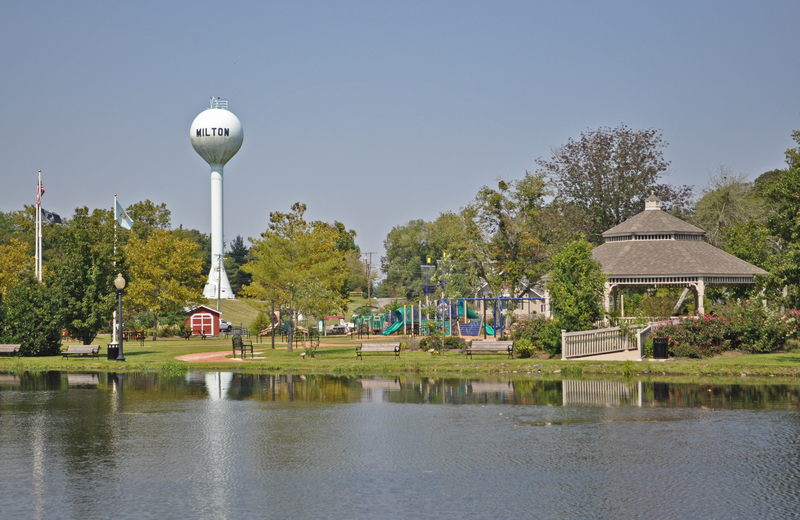Milton engineer pushes new water tower
Residents say Milton is moving too quickly with a referendum to borrow money for a water system upgrade because the town still doesn't know where more than a third of it's water is going.
Resident Allison Howes said she would like accurate water usage statistics before casting a vote.
“Why are we having a referendum when we are missing 44 million gallons of water [annually]?” she said. “How are we going to vote when we have figures like this? If we had the correct figures then we could vote responsibly.”
Milton Town Engineer Scott Hoffman says a new water-storage system south of the Broadkill River would give the town a redundant system that will improve reliability and water pressure. An elevated storage tank is the town's best option to solve a water shortage problem, he said.
Hoffman, an engineer with Cabe Associates, explained the pros and cons of various water storage methods at public meetings Feb. 28 and March 1 at the Milton library.
The town has two water towers that hold 150,000 and 75,000 gallons, or a total of 225,000 gallons. In order to have an adequate water supply, Hoffman said, storage should match the town's daily usage, 360,000 gallons, plus water needed for fire protection, 184,000 gallons. In total, the town needs about 544,000 gallons in storage. The proposed plan would also include a new water treatment facility, wells, water mains and the purchase of about an acre of land on Atlantic Street where the new facility will be constructed.
Howes wonders why the town is planning to build a new 500,000-gallon tank when more than a third of the town's water is unaccounted for. She said the town should first determine the actual water usage and then determine the size of the tank. If the town can find most of the missing water, she said it would likely be another 120 years before the town would need another tank.
In response to comments about a smaller tank, Hoffman said long-term, it would be more cost effective for the town to build a larger tank.
“It would cost more dollars per gallon to build a smaller tank,” he said. “That's one of the things you need to do in the design phase of the project – look at the different tank sizes available and the capital cost.”
Bringing the town's storage up to date is only one reason the project is needed, Hoffman said. With the town continuing to grow south of the Broadkill River, he said, an elevated storage tank is needed in the southern part of town to maintain strong water pressure throughout the municipality. Currently, two water mains cross the Broadkill River to provide water service to customers.
“The farther you are from the water source, the weaker the pressure is going to be,” Hoffman said.
The upgrades would create redundancy in the town's system, meaning if the current water treatment facility is incapacitated for any reason, water could still be pumped and treated at the new facility. Mayor Cliff Newlands said the town was without water two days last year due to problems with the system.
Some residents said they are hesitant to move forward with this project until the town resolves its missing water situation. At the Feb. 6 town council meeting, residents learned the town can't account for about 11 million gallons of water per quarter, or more than a third of the water pumped from the wells.
Hoffman said public works employees are zeroing in on the missing water. He said 14 meters do not work; six churches, the police station and the fire company are not metered; eight homes have inaccurate meters; and 94 old manual-read meters need to be replaced. He said that likely won't account for all of the missing water, but it will give officials a more accurate figure. Town workers are also working with the Delaware Rural Water Association to determine if there is a leak in the system.
Warren said missing water is somewhat common, with many systems missing 10 percent to 15 percent of their water.
“Why are we having this rush to judgement for a referendum?” said resident Ginny Weeks. “Why not do it in July when we know how much water we're using and where it's going and where it's gone to? “
Newlands said the town needs to expand water storage regardless of the missing water.
“We still need the redundancy on the other side of town, and we only have one well house right now,” he said. “If we have a problem with the system, we have no water, and this system was without water two days last year.”
Some residents aren't convinced a water tower is the most efficient and cost-effective water storage method. At the request of residents, Hoffman presented other ways to store water and explained why they were not the best option for the town.
A ground-level storage tank of the same size would be cheaper to build, but, he said, the town would likely pay more money in the long run because ground systems require water pumps.
“The problem with the ground level storage tank is it doesn't provide any water pressure,” he said. “You're going to need additional pumps; you're going to spend additional money on running those pumps and they need to be sized for your peak flow.”
He said a pressure of 20 PSI is required to provide adequate water pressure throughout the town. Most ground-level water storage tanks are used by smaller communities, not by municipalities of Milton's size. Ground-level tanks are also used in towns with hilly landscapes, where a tank can be placed at the top of a hill and gravity can do the work, he said.
Another option would be underground water storage. To his knowledge, Hoffman said no one in Sussex County uses underground storage. While it is allowed, he said, it would be cost-prohibitive because the fire marshal would require the town to do a hydrogeological study each year to verify the amount of water in the vessel – a very costly endeavor.
Ultimately, the final decision on whether the town will move forward with storage tanks will be determined through a referendum scheduled for 8 a.m. to 6 p.m., Saturday, March 24. All residents, including renters and nonresident property owners, will be asked if the town may borrow up to $3.45 million for the project.
The borrowed money will be paid back over a 30-year period.
Residents to decide: Should Milton borrow $3.45 million?
In order to pay for proposed water system upgrades, Milton officials plan to borrow up to $3.45 million from the state Office of Drinking Water's State Revolving Fund. The town was in line to receive the funds but was notified last month it was bypassed for a project closer to construction. Program Administrator Heather Warren said the town could still receive funding this year.
“Towns drop funding all the time. I might have a list of 15 projects and – this is the truth – three of them have dropped off in the last two weeks,” she said. “So it's not like [Milton's application] has been thrown in the trash never to be seen again. If there is more money that comes available I'm certainly going to put [Milton] back on the list.”
If funds do not become available, Newlands said the town will reapply in August, when they hope to receive a loan with similar terms. The original loan came with 35 percent principal forgiveness and a 1 percent interest rate over 30 years. The repayment would be reflected in residents' water bills. If the town receives a loan with those terms, Hoffman anticipated residents' water bills would increase about $6 per quarter in the flat rate. With no forgiveness, Hoffman said it's likely bills would increase about $12 per quarter. New customers would be subject to increased impact fees.
A referendum will be held 8 a.m. to 6 p.m., Saturday, March 24, at town hall to determine if the town may move forward. Residents will not vote on the project itself, but rather the maximum amount of money the town may pursue for a loan. The terms of the loan will not be included on the ballot because they are not yet known.

















































